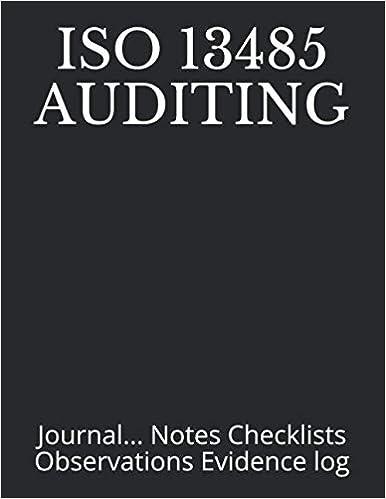Question
CHAPTER 5: In his own words, Daniel Jones was The Dude. With his waist-long dreadlocks, part-time rock band, and well-paid job managing a companys online
CHAPTER 5:
In his own words, Daniel Jones was The Dude. With his waist-long dreadlocks, part-time rock band, and well-paid job managing a companys online search directoryhe seemed to have it all. Originally from Germany, Jones, now age 32, earned his doctorate and taught at the University of Munich before coming to the United States, where he started his career in computers. When Jones started working with the company as a director of operations for U.S.-Speech Engineering Service and Retrieval Technologyhe was assigned to work on a new, closely guarded search engine tied to the companys .net concept.
The company allows employees to order an unlimited amount of software and hardware, at no cost, for business purposes. In one years time, Jones ordered or used his assistant and other employees (including a high school intern) to order nearly 1,700 pieces of software which had very low cost but were worth a lot on the street. He then resold them for reduced prices reaping millions. When items with a cost of goods sold of more than $1,000 are ordered, an e-mail is sent to the employees direct supervisor, who must click on an Approve button before the order is filled. In no individual order was the cost of goods more than $1,000he made sure none of the orders required a supervisors approval. The loosely controlled internal ordering system reflects the trust the company puts in its employees.
During this time frame, FBI agents said they saw Jones exchanging a large box of software for cash in a department store parking lot. The FBI contacted the companys security and began monitoring Joness bank accounts. Previously, one account with his bank had an average balance of $2,159. In a short time, however, the average balance ballooned to $129,775. Another account at another bank showed irregular deposits totaling $500,000none of which appeared to be from any legitimate income or other source.
Investigators also noted that Jones purchased a Ferrari, a Jaguar, and traded in lesser vehicles for a Hummer, a Mercedes, and a Harley-Davidson motorcycle. He also bought an $8,000 platinum diamond ring, a $2,230 wristwatch, and a $4,000 bracelet. You figured that I like big boys toys by looking at some of my pictures, Jones wrote on his personal Web page. I just cant resist. The Dudes Web page includes a camera for monitoring his cat and photos of his yacht, cars, and other treasures. For a relatively low-level manager, it was an impressive collection. But at his company, where teenage software engineers can earn more than company directors, no one noticed anything unusual.
A neighbor across the street from Jones said that he was clearly wealthy, but not flamboyant with his money. He described Jones as an intelligent man who didnt flaunt his education, would loan neighbors tools, and was always friendly. The neighbor was surprised to hear the accusations against someone he called his friend. All he knew about Jones was that he was a good neighbor who loved cars. He was very, very helpful. The few times I had problems with my PC, hed come and help straighten them out, the neighbor said. They are just ideal neighbors. I feel terrible for him and his wife. Jones and his wife lived in a modest home.
Jones also joined the citys Rotary Club, where he seemed more outgoing and personable than the stereotype techie, said a local jeweler and immediate past president of the club. He seemed like what I would expect a genius software developer to be. Eventually, the fraud was discovered and Jones was fired. He was also charged with 15 counts of wire, mail, and computer fraudwith each count carrying a maximum of fives years in prison. He is expected to remain in custody until his preliminary hearing.
Questions:
1. Describe the symptoms of fraud that might be evident to a fellow employee.
2. Recently, his employer has been putting more emphasis on controlling costs. With the slowing of overall technology spending, executives have ordered managers to closely monitor expenses and have given vice presidents greater responsibility for balance sheets. What positive or negative consequences might this pose to the company in future fraud prevention?
3. As discussed previously, all frauds involve the following key elements: perceived pressure, perceived opportunity, and rationalization. Describe two of the key elements of the Jones fraud pressure and opportunity.
4. From the scenario, what measures has the company taken to prevent fraud? In what ways could the company improve?
Step by Step Solution
There are 3 Steps involved in it
Step: 1

Get Instant Access to Expert-Tailored Solutions
See step-by-step solutions with expert insights and AI powered tools for academic success
Step: 2

Step: 3

Ace Your Homework with AI
Get the answers you need in no time with our AI-driven, step-by-step assistance
Get Started


